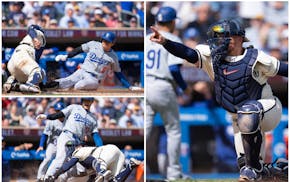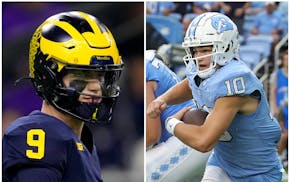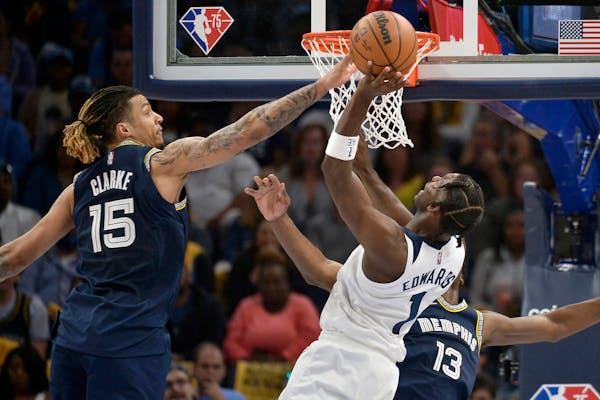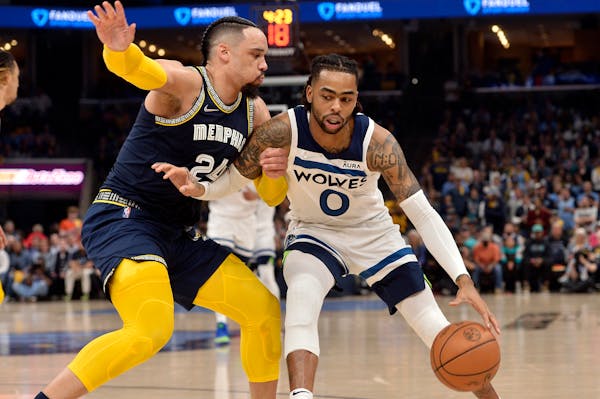Anthony Edwards gambled on defense and got burned.
D'Angelo Russell took matters into his own hands with an isolation move and his shot badly missed the mark.
Chris Finch allowed his team to play out a possession without calling a timeout and "hero ball" ensued.
Karl-Anthony Towns trolled the Memphis crowd prematurely with a shush sign and his team lost.
Growing pains are indeed painful, aren't they? That is what we are witnessing from the Timberwolves in an agonizing, maddening display in a playoff series that could've been over by now, in their favor — except it's not, and the Wolves find themselves backed into a must-win predicament.
This series through five games feels like a contradiction. Gut reaction says the Wolves are an equal, if not better, overall team. The scoreboard says they trail the Grizzlies 3-2 with Game 6 set for Friday at Target Center.
If the Wolves lose the series, they will look back with regret. If they manage to win the final two games, they will have found more resolve than many of us thought was possible.
Whichever happens, they are getting schooled on playoff basketball and how not to handle critical situations, which is valuable to their growth but is hardly comforting in the moment.
What a strange series to put into proper context. The Wolves look alternately dominant and unaware of what it takes to win. They are good enough to build double-digit leads in the fourth quarter of Games 3 and 5, but lack the maturity and poise needed in the final minutes.
It is one thing for an inexperienced team to look overmatched in its first taste of playoff basketball. That is not the case here. The Wolves have been the superior team for long stretches.
The difference has boiled down to late-game execution. Every possession, every shot, every missed rebound, every mistake gets scrutinized extra because games — and by extension, entire series — often swing on those individual moments.
The Wolves must learn how to close out tight games. That's the obvious takeaway. The path there is by having these experiences, good and bad, but only if they grow from them. Few players or teams take the playoffs by storm without hiccups and hard lessons learned.
Edwards admitted after Game 5 that he made a "dumb mistake" by trying to steal the ball from Ja Morant on the inbounds play that resulted in the game-winning layup.
He's right. It was ill-advised, and it was costly. Should he know better than to go for a steal in that situation? Ideally, yes, but he's also a supremely confident competitor trying to make a play.
Edwards is a wonderful talent, but he's also a 20-year-old experiencing his first playoffs. He doesn't have everything figured out. He's going to learn by trial and error. The situational awareness required in those moments is not easily replicated. Edwards and the Wolves have to live through it.
If the Wolves' offense deteriorates into stagnant isolation ball in the fourth quarter on a Tuesday night in January, it's a minor annoyance but they move on to the next game. When it sabotages their chances to win Game 5 of a playoff series, their lack of poise and mental toughness to stick with a working plan gets exposed and magnified — and ridiculed on a national level.
This is a learning experience for Finch as a head coach, too. He didn't use a timeout during a 21-0 run in the Game 3 meltdown. He also decided not to use a timeout in Game 5 when trailing by one inside the final 30 seconds on a possession that ended with Russell forcing a terrible shot.
That situation screamed for a set play and better awareness to get Edwards or Towns a shot. Instead, Russell looked like he was winging it in a critical moment.
The series isn't lost. The Wolves still have an opening. This entire experience has been a discovery about playoff basketball, and the lessons are adding up.

Scoggins: Finch feeling heat of the Suns as playoff battle looms
Scoggins: Why 'championship or bust' fits these Wolves

Scoggins: Anatomy of a game-saving play as Correa throws out Ohtani



